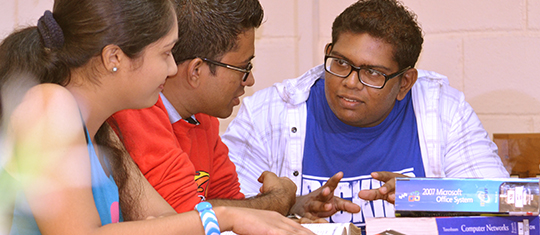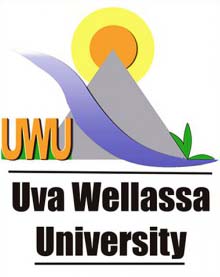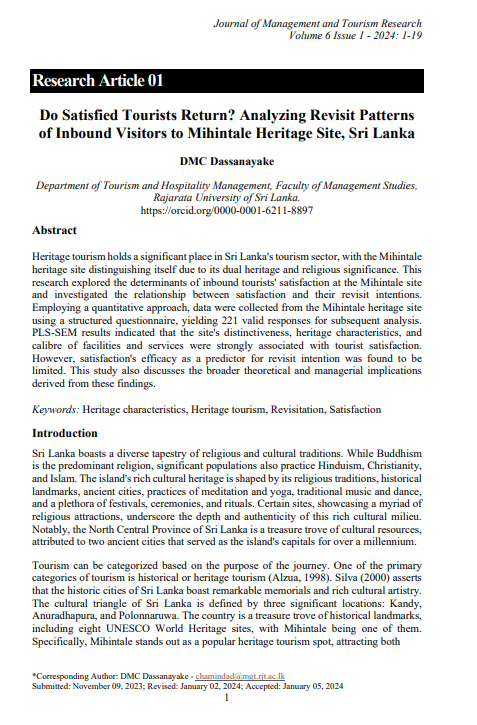Volume 06, Issue 02
TABLE OF CONTENTS
01. Environmentally Sustainable Practices and Hotel Performance: Insights from Diffusion of Innovation Theory
K.V.A. Shantha
INFORMATION
Journal Title: Journal of Management and Tourism Research
Volume : 6 Issue : 02
Page : 1- 12
K.V.A. Shantha
Department of Accounting and Finance, Faculty of Management Studies, The Open University of Sri Lanka, Nawala, Nugegoda, Sri Lanka.
.
ABSTRACT
In response to global sustainability challenges, hotels, as the most resource-intensive businesses in the hospitality industry, face constant pressure to adopt environmentally sustainable practices. Consequently, researchers are increasingly interested in identifying the factors that influence the adoption of these practices. However, existing studies have typically examined these factors in isolation without capturing the complexity of their interactions, which limits a comprehensive understanding of this phenomenon. Hence, based on the insights from Diffusion of Innovation Theory, this study aims to address this gap by providing a comprehensive analysis of these factors with their interconnected effects within a moderated mediation conceptual model. Data were collected from 226 managers of 3- to 5-star-rated hotels and analyzed using the PROCESS procedure for SPSS. Extending the existing literature on environmentally sustainable practices in hotels, the study’s results show that employee engagement partially mediates the effect of perceived usefulness of adopting environmentally sustainable practices on hotel performance. This partial mediation suggests that the potential positive effect of environmentally sustainable practices on hotel performance is facilitated by the presence of employee engagement towards such practices. Further, the study supports the role of stakeholder demand in amplifying the potential benefits of these practices. Specifically, increased stakeholder demand can inflate the positive effect of the perceived usefulness of sustainable practices on employee engagement towards them. Accordingly, the study concludes that the successful adoption of environmentally sustainable practices and their impact on hotel performance are influenced by the interconnected effects of perceived usefulness, stakeholder demand, and employee engagement. These findings offer valuable insights for hotel owners and managers, and policymakers to improve the adoption of sustainable practices and thereby contribute to achieving Sustainable Development Goals.
Key Words : : Employee engagement, environmentally sustainable practices, hotel performance, moderated mediation model, perceived usefulness, stakeholder demand
02. The Study of Identifying the Factors Affecting Online Learning Acceptance among Postgraduate Students
W.W.D.P. Fernando 1, P. Lankeshwara 2
INFORMATION
Journal Title: Journal of Management and Tourism Research
Volume : 6 Issue : 02
Page : 13- 25
W.W.D.P. Fernando 1, P. Lankeshwara 2
1,2 Faculty of Management, Social Sciences and Humanities, General Sir John Kotelawala Defence University, Sri Lanka.
1 https://orcid.org/0000-0002-4276-6122
2 https://orcid.org/0000-0003-2221-2314
ABSTRACT
Online learning started to gain popularity across the world along with the outbreak of COVID-19 pandemic. Therefore, the objective of this study is to determine the variables that influence the acceptance of online education among postgraduate students. The study is based on the Technology Acceptance Model (TAM), which investigates the influence of variables such as perceived usefulness, perceived ease of use, social influence, and perceived quality of work on students’ behavioral intentions towards online learning. A sample of 133 postgraduate students from a university in Sri Lanka was surveyed using a structured questionnaire. 62 respondents are following a degree program of Master of Science in Management (MSc) while 71 respondents are following a degree program of Master in Business Administration (MBA) and as a percentage, 46.6% is MSc and 53.1% is MBA. The collected data was then analyzed using statistical methods such as Pearson’s chi-square test and binary logistic regression. The results indicate that the acceptance of online learning is significantly influenced by perceived usefulness, perceived ease of use, social influence, and perceived quality of work. The binary logistic regression model had an overall predictive accuracy of 82.7%, suggesting that these characteristics combined account for a substantial proportion of the variability in students’ behavioral intentions to accept online learning. The study asserts that improving the ease of use, fostering peer support, and assuring cost-effectiveness are essential factors for enhancing the popularity of online learning among postgraduate students. The findings have significant importance for educational institutions aiming to enhance the utilization of online learning platforms, especially in light of continuous technological progress and evolving educational environments.
Keywords: : Education technology, student engagement, teaching and learning environment
03. Assessing the Risk Perception of Genetically Modified Crops among Farmers in Nigeria: Implications for Agricultural Insurance Policies
N.G. Alli
INFORMATION
Journal Title: Journal of Management and Tourism Research
Volume : 6 Issue : 02
Page : 27- 44
N.G. Alli
Department of Insurance, Federal Polytechnic Offa, Nigeria
ABSTRACT
The adoption of genetically modified organisms (GMOs) in agriculture has been a subject of intense debate and varying acceptance levels globally. While GMOs offer substantial benefits such as enhanced crop yields, pest resistance, and improved nutritional content, their adoption in Nigeria remains limited and contentious. This limited adoption is particularly concerning given Nigeria’s significant agricultural sector, which employs about 70% of the workforce and is a critical component of the national economy. This study assessed the risk perception of genetically modified (GM) crops among Nigerian farmers and its implications for agricultural insurance policies. A survey design was employed, with a purposive sample of 376 farmers. The research examined socio-economic factors influencing risk perceptions, the impact of these perceptions on GM crop adoption, and the relationship between risk perception and willingness to purchase crop insurance. Results indicated that education level (t = 3.45, p < .001), access to information (t = 4.12, p < .001), cultural beliefs (t = 2.76, p < .01), and trust in regulatory bodies (t = 3.89, p < .001) significantly influenced farmers’ risk perceptions. These perceptions negatively impacted GM crop adoption (t = -2.95, p < .01). A significant relationship was found between risk perception and willingness to purchase crop insurance (r = .591, p < .001). Existing agricultural insurance policies were found inadequate in addressing GM crop-specific concerns (t = -3.15, p < .002). The study revealed challenges in implementing the regulatory framework for GM crops, contributing to public scepticism and slow adoption rates. Recommendations include developing comprehensive educational programs, tailoring insurance products to GM crop risks, enhancing regulatory enforcement, and increasing public engagement.
Keywords: Agricultural insurance, farmer adoption, genetically modified crops, Nigeria, risk perception
04. Impact of Socialization Agents on Adolescent Consumer Vulnerability: Moderating Role of Family Structure
(Evidence from Franchised Fast-Food Industry in Sri Lanka)
G.P.K. Nishadi
INFORMATION
Journal Title: Journal of Management and Tourism Research
Volume : 6 Issue : 02
Page : 45 – 67
G.P.K. Nishadi
Department of Marketing, Faculty of Management and Finance, University of Ruhuna, Sri Lanka
ABSTRACT
Adolescent consumers are generally more interested in consuming junk food than they are in eating homemade meals. Researchers with prior experience in the field assert that socializing agents shape adolescents’ nutritional knowledge, preferences, and purchase decisions. It was also found that there are variations in fast food intake according to family structure. In light of these circumstances and the dearth of previous studies in the field, the aim of the study was to examine the impact of socialization agents on the vulnerability of adolescent consumers with the moderating effect of family structure. Using a stratified random sample technique, 910 adolescents enrolled in government schools in Sri Lanka were asked to complete a 69-item self-administered questionnaire, which served as the major data collection tool. The findings confirmed the first five hypotheses, demonstrating that the five socialization agents—Parents, Peers, TV advertising, the Internet, and Retailers—had a positive effect on the vulnerability of adolescent consumers in Sri Lanka’s franchised fast-food sector. Furthermore, it was shown that family structure significantly moderates the effect of parental influence on adolescent consumer vulnerability in franchised fast-food industry in Sri Lanka. In conclusion, the current research offers significant perspectives for scholars and practitioners that aim to investigate teenage consumers’ purchasing habits.
Keywords: Adolescent consumer vulnerability, family structure, fast-food industry, socialization agents
05. A Study on Exploring the Potential of Community-Based Tourism in Fostering Reconciliation in Post-Conflict; A Case Study of Jaffna, Sri Lanka
P.K.U. Perera1 , J.P.R.C. Ranasinghe2
INFORMATION
Journal Title: Journal of Management and Tourism Research
Volume : 6 Issue : 02
Page : 69 – 87
P.K.U. Perera1 , J.P.R.C. Ranasinghe2
1,2Department of Tourism Studies, Faculty of Management, Uva Wellassa University of Sri Lanka
ABSTRACT
Following nearly three decades of civil war, Jaffna, Sri Lanka, has faced numerous socio-economic and psychological challenges, highlighting the requirement of effective reconciliation and rebuilding strategies. This study explores the role of community-based tourism (CBT) in promoting reconciliation in the post-conflict region of Jaffna, Sri Lanka. The primary objective is to understand how CBT can contribute to these processes by enhancing economic development, social cohesion, and cultural preservation. A qualitative research design with a phenomenological approach was used to capture the experiences of 20 participants, including community members, tourists, and tourism operators. Data were collected through in-depth interviews and participant observation, providing detailed insights into the impact of CBT initiatives. The collected data were analyzed using the thematic analysis. The findings showed that CBT significantly improves economic stability through job creation and local business growth, enhancing residents’ quality of life. Socially, CBT fosters community cohesion, social integration, and individual empowerment through capacity building and participatory governance. Culturally, it aids in preserving and revitalizing traditional practices and heritage. Additionally, CBT plays a crucial role in reconciliation by facilitating dialogue, building trust, and promoting intercultural understanding among diverse ethnic groups. However, challenges such as infrastructure deficiencies, community resistance, and inconsistent government support must be addressed for sustainable development. This study highlights the essential role of CBT in post-conflict recovery and provides practical recommendations for policymakers, tourism practitioners, and community leaders to leverage CBT for sustainable peace and development in Jaffna.
Keywords: Community-based tourism, Jaffna, peacebuilding, post-conflict, reconciliation, social cohesion
06. Circular Business Model Innovations for Sustainability :Insights from Sri Lanka
F.M. Fairoz1 , G.T.W. Sriyani2
INFORMATION
Journal Title: Journal of Management and Tourism Research
Volume : 6 Issue : 02
Page : 89 – 110
F.M. Fairoz1 , G.T.W. Sriyani2
1,2Department of Management and Entrepreneurship, University of Ruhuna, Sri Lanka
ABSTRACT
Waste is known as a valuable resource and proper waste management would help to identify new business opportunities in the environmental sector. Circular entrepreneurship plays an important role to create innovative business models from waste to reduce negative environmental impact. In this setting, present study aims to uncover circular business models in Sri Lanka emphasizing its drivers, challenges, and contribution to sustainability. The study employed qualitative research approach by conducting in-depth interviews with 6 circular entrepreneurs. The findings of the study reveal that addressing environmental issue, passion, knowledge and experience, creativity, networking, research & development, and learning drive them to create circular business models. Further, they are facing several challenges particularly lack of access to finance, inadequate support from the government, finding market, lack of knowledge and negative attitudes among the community, and lack of technology. This study provides insights to the practitioners and policy-makers in Sri Lanka to facilitate circular entrepreneurs to successfully develop circular business models that impact the triple bottom line and achieve sustainable development goals. The study expands the knowledge of circular business model innovation specifically in developing countries. The study conveys unique results in relation to circular business model innovation in Sri Lanka and practical implications for the stakeholders to develop this sector.
Keywords: Challenges, circular business model innovations, circular entrepreneurship, drivers, sustainability



